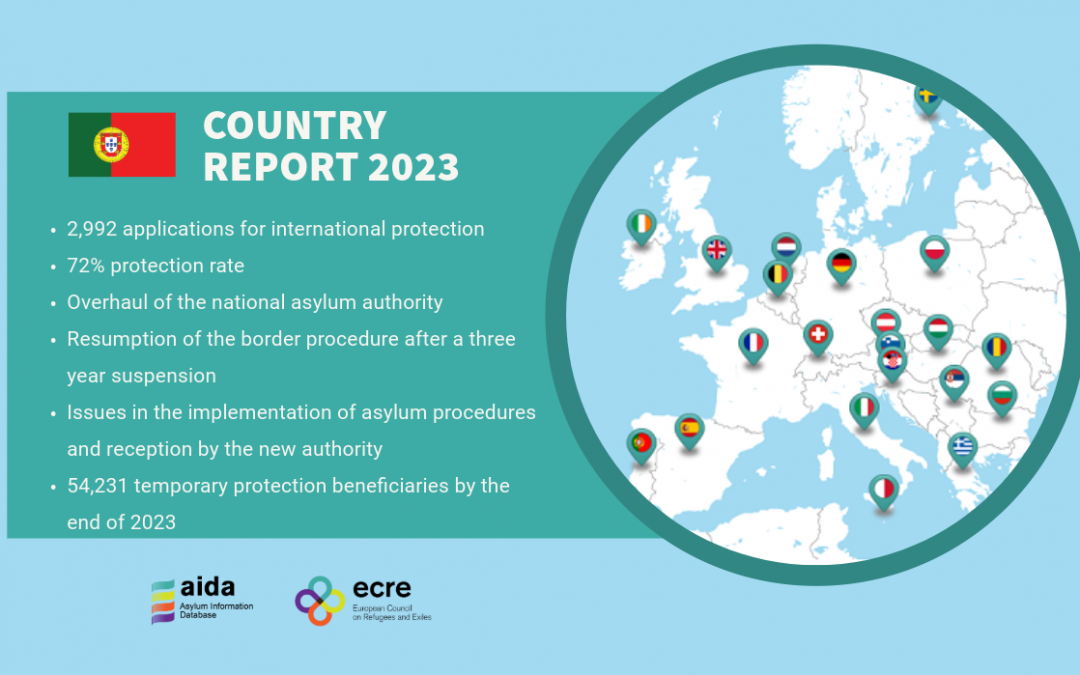The updated AIDA Country Report on Portugal provides a detailed overview of legislative and practice-related developments in asylum procedures, reception conditions, detention of asylum seekers and content of international protection in 2023. It also includes an annex which provides an overview of temporary protection (TP).
2,992 applications for international protection (including 277 resettlement cases) were registered in Portugal in 2023. In the same year, 562 first instance decisions were made and international protection was granted in 404 cases (72% protection rate). 306 appeals were lodged against negative asylum decisions (26% increase compared to 2022).
As of 31 December 2023, Portugal had registered 54,231 TP beneficiaries since March 2022.The duration of TP was extended twice in 2023 and 2024, with residence permits now valid until 31 December 2024. Delays in the issuance of TP certificates were reported in 2023, especially for non-Ukrainian beneficiaries. According to the Portuguese authorities, this was notably due to their cases requiring more detailed analysis, particularly regarding documentary and security checks.
The Asylum Act was amended three times in 2023 in order to complete the transition from the Immigration and Borders Service (SEF) to the Agency for Integration, Migration and Asylum (AIMA) which began operating on 29 October 2023. The institutional changes also resulted in the general police force assuming responsibility for border control and the execution of expulsion decisions. Although this reform may have positive outcomes in terms of separating administrative and law enforcement competencies, civil society organisations (CSOs) have highlighted a number of shortcomings, including difficulties in obtaining information regarding AIMA’s procedures. CSOs have also observed gaps in the implementation of the asylum procedure, notably regarding registration and interviews, and AIMA reception conditions.
The reform that took place on 31 August 2023 also introduced substantive amendments to the Asylum Act, notably regarding the application of the safe third country concept, the wording of the exclusion and withdrawal security clauses, and the time available for applicants to reply in writing to the report on their application (reduced from five to three working days).
The reforms also shifted the responsibility for the provision of material reception conditions from the Ministry of Internal Administration to the Ministry of Labour, Solidarity and Social Security. CSOs have reported shortcomings in the provision of adequate reception conditions by the AIMA, including lack of information, lack of access to material reception conditions and lack of access to adequate housing, particularly for unaccompanied minors. They also reported severe issues in the provision of funding from the EU’s Asylum, Migration and Integration Fund at the national level in 2023. Combined with delays, this resulted in a number of organisations, which are heavily involved in Portugal’s reception system, having to limit their material and human capacities, and sometimes even prevented them from receiving new applicants in their centres.
Finally, regarding the detention of asylum seekers, the application of the border procedure was resumed in November 2023 following a suspension that lasted for more than three years. This has resulted in asylum seekers being refused entry and detained in transit zones at Lisbon airport in conditions which have been described as incompatible with human dignity and which have been publicly condemned by Portugal’s national preventive mechanism.
The full report is available here, and the annex on temporary protection is available here.
For more information about the AIDA database or to read other AIDA reports, please visit the AIDA website.

